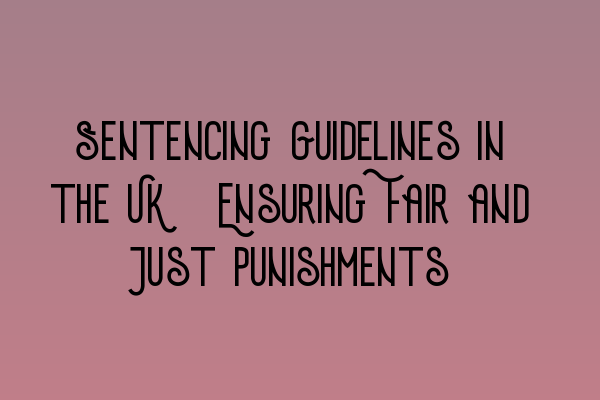Sentencing Guidelines in the UK: Ensuring Fair and Just Punishments
When it comes to criminal law in the United Kingdom, sentencing guidelines play a crucial role in ensuring fair and just punishments are handed down by the courts. These guidelines provide a framework for judges and magistrates to consider various factors before determining an appropriate sentence for a particular offence. Let’s explore the significance of sentencing guidelines and how they contribute to the criminal justice system in the UK.
The Purpose of Sentencing Guidelines
Sentencing guidelines serve multiple purposes. Firstly, they help promote consistency and uniformity in sentencing across different courts and judges. By providing a set of principles and considerations, they enable the courts to deliver similar punishments for similar offences, which ultimately enhances public confidence in the criminal justice system.
Secondly, sentencing guidelines encourage transparency and accountability in the sentencing process. They ensure that judges and magistrates provide clear justifications for the sentences imposed, taking into account both aggravating and mitigating factors. This transparency helps maintain public trust and allows for effective appellate review if necessary.
The Factors Considered in Sentencing
When determining a suitable sentence, judges and magistrates take into account various factors, including the nature and seriousness of the offence, the culpability of the offender, and the impact of the crime on the victim and the wider community. Other factors such as the offender’s previous convictions, their personal circumstances, and any mitigating or aggravating factors are also considered.
It is important to note that the Sentencing Council, an independent body responsible for setting sentencing guidelines in England and Wales, provides detailed guidance on different types of offences, taking into account the specific circumstances that may affect the seriousness of the crime and the appropriate sentence.
The Role of Legal Professionals
Legal professionals, including solicitors, barristers, and legal advisers, play a crucial role in ensuring that sentencing guidelines are appropriately applied in individual cases. By carefully assessing the facts and circumstances of a case, legal professionals can provide expert advice to the courts regarding the appropriate sentence and any potential mitigating or aggravating factors that need to be considered.
It is essential for legal professionals to stay updated with the latest sentencing guidelines, as they are regularly revised and updated by the Sentencing Council. This ensures that they can provide accurate and reliable advice to their clients and effectively advocate for fair sentences.
Conclusion
Sentencing guidelines are a crucial aspect of the criminal justice system in the UK. They help maintain consistency, transparency, and accountability in the sentencing process, ensuring that fair and just punishments are imposed for criminal offences. Legal professionals play a fundamental role in applying these guidelines effectively and advocating for their clients. By keeping up-to-date with the latest sentencing guidelines, solicitors and other legal experts at SQE Criminal Law & Practice Law UK can provide exceptional representation and ensure the interests of their clients are protected.
For more information on the SQE exams and preparation courses, you can check out the following articles:
- SQE 1 Practice Exam Questions
- SQE 1 Practice Mocks FLK1 FLK2
- SQE 2 Preparation Courses
- SQE 1 Preparation Courses
- SRA SQE Exam Dates
